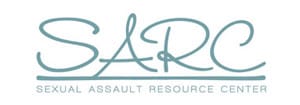What is Advocacy and What Does an Advocate Do?
At SARC, advocacy means walking alongside survivors as they navigate trauma, systems, and healing. Our advocates provide support in many ways, always centering the survivor’s choices and needs.
Some basics about SARC advocacy:
- Our services are free, confidential, and available 24/7 through our Support & Resource Line.
- Advocates are trained to listen, provide emotional support, share accurate information, and support survivors in making decisions that feel right for them.
- We are not affiliated with law enforcement, and you do not need to report a crime to access our services.
What Services Can SARC Advocates Provide?
SARC offers a range of services, including our 24-Hour Support & Resource Line, Medical Advocacy, Legal Advocacy, and Peer Support Groups & Workshops.
In addition, advocates provide:
Information and Referrals
- Guidance on legal and medical options.
- Referrals to social services, counseling providers, and community resources.
- Information on trauma, healing, and self-care.
Systems Advocacy
- Support addressing barriers in systems such as healthcare, housing, schools, social services, and the legal system.
- Advocacy with agencies like the police department, District Attorney’s Office, or DHS, if the survivor chooses.
- Efforts to improve system responses so survivors are treated with dignity and care.
Housing Advocacy
- Support navigating housing challenges as a result of sexual assault.
- Safety planning, referral to shelters and housing programs.
- Support with landlords or other providers.
- Always centering the survivor’s safety and choice.
Support for Family, Friends, and Community Members
Survivors are often supported by family, partners, friends, teachers, healthcare providers, and others in their community. These supporters may also need help processing their own feelings or learning how to respond in helpful ways. SARC advocates can:
- Interrupt victim-blaming or harmful behaviors.
- Educate supporters on how to best respond to survivors.
- Validate and support feelings of anger, shock, or secondary trauma.
- Provide referrals for additional support.
How Can I Get an Advocate?
You can connect with an advocate any time by calling, texting, or chatting through our 24-Hour Support & Resource Line. You can also call our business line during the daytime at (503)626-9100, option 4.
If you are looking for services outside of Washington County or the Portland metro area, SARC can help you connect with programs across Oregon or you may contact RAINN (Rape, Abuse & Incest National Network) for national support.
Frequently Asked Questions
Who can access SARC services?
Any person affected by sexual violence—whether it happened recently or long ago—as well as friends, partners, or family members seeking support.
Are SARC services free?
Yes. All of our survivor services are free of charge. We may provide referrals to other organizations, and some of those services may not be free, but there is never a cost for SARC’s advocacy and supportive services.
Are services confidential? Will you keep information about me?
Yes. SARC is a privileged, confidential advocacy program. This means we do not share any information without your clear, written permission—even with law enforcement, social services, or immigration officials. This confidentiality extends to minors as well. In rare cases, some staff or volunteers may also be mandatory reporters; when that applies, they will always explain their role before collecting information.
Will I have the same advocate every time?
Not always. While some survivors may interact often with a particular advocate (for example, a legal or medical advocate), all of our staff and volunteers are trained to provide compassionate, survivor-centered support.
